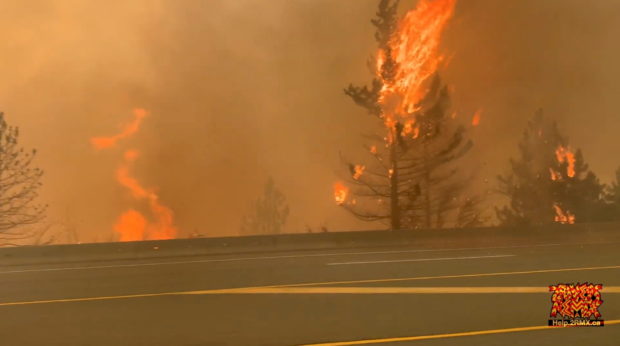Forest fire guts small western Canada town after days of record-breaking heat

Trees burn along a street during a wildfire in Lytton, British Columbia, Canada June 30, 2021 in this still image obtained from a social media video on July 1, 2021. (2 RIVERS REMIX SOCIETY/via REUTERS)
A forest fire that began after three days of record-breaking temperatures has destroyed most of the small western Canadian town of Lytton and damaged a nearby hydro power station, a local politician said on Thursday.
More than 1,000 people in and around Lytton, in central British Columbia, were evacuated late on Wednesday after the fast-moving fire engulfed the community, catching residents by surprise. The cause of the fire was being investigated, B.C Premier John Horgan told reporters.
This week Lytton broke Canada’s all-time hottest temperature record three times.
The sizzling heat wave also ravaged the U.S. Northwest with record-high temperatures. Some 62 new fires were reported in B.C. in the past 24 hours, Horgan said.
“The town has sustained structural damage and 90% of the village is burned, including the centre of the town,” Brad Vis, a Member of Parliament for Mission-Matsqui-Fraser Canyon, said in a Facebook post.
Article continues after this advertisementHe said the fire also caused extensive damage to BC Hydro stations and highways, limiting access to Lytton by road.
Article continues after this advertisementB.C. officials told the briefing that “most homes and structures” in Lytton have been lost. Some residents have not been accounted for and police are investigating.
Amateur video footage showed residents scrambling to get out of town in cars as fires burned down trees and some structures. The fire spread so swiftly that people were forced to leave behind belongings.
Lytton Mayor Jan Polderman ordered everyone in the town of 250 to vacate late on Wednesday.
“It’s dire. The whole town is on fire,” Polderman told the CBC. “It took, like, a whole 15 minutes from the first sign of smoke to, all of a sudden, there being fire everywhere.”
Residents of another 87 properties north of Lytton were also ordered to leave on Wednesday.
Lytton set a record of 49.6 degrees Celsius (121.28 degrees Fahrenheit) on Tuesday. The previous high in Canada, known for brutally cold winters, was 45 degrees Celsius, set in Saskatchewan in 1937.
On Wednesday, strong winds gusting up to 71 kph (44 mph) were recorded in the area, further flaming the fires.
In British Columbia, at least 486 sudden deaths were reported over five days to Wednesday, nearly three times the usual number that would occur in the province over that period, the B.C. Coroners Service said on Wednesday.